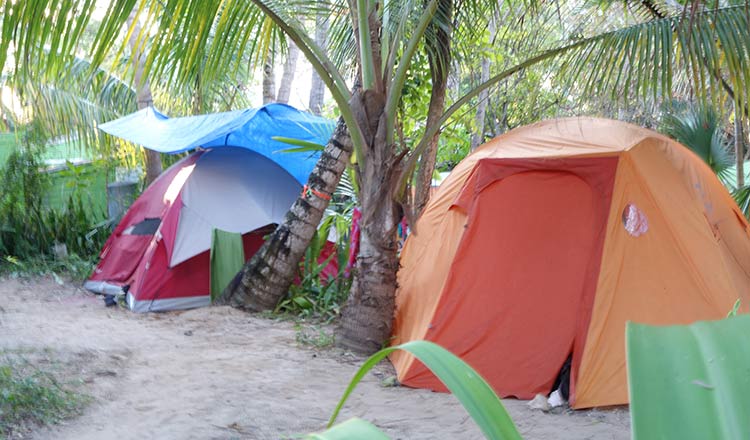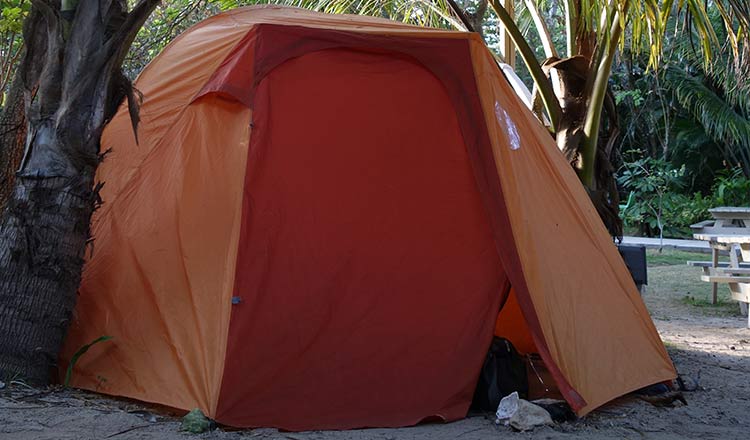Accommodations
The cost of ATTC/TTC is based on your housing choice.
Tent Space
| Tent Space | November – May | June | July |
| $2,400 | Not available | Not available |
Tent Hut Single
| Tent Hut Single | November – May | June | July |
| $3,300 | $2,400* | Not available |
Single Room
| Single Room | November – May | June | July |
| $5,300 | $5,300 | $5,300 |
Tent Hut Double (private)
| Tent Hut Double (private) | November – May | June | July |
| $3,600 | $3,600 | Not available |
Payment Information
A $300 deposit is required when you register in order to guarantee your place. The balance is due at least 14 days before your arrival. We will send you an email reminder a week before we process the balance.
For other housing options (at standard rates) and for any other questions
- Please email [email protected]
- Or call the TTC advisor:
US and Canada: 1-877-268-4091;
All other countries: 416-479-0199 ext.129.
***
Please note:
- Rates are in US dollars.
- A Bahamian VAT tax of 10% is NOT included and will be added.
- Prices include tuition, accommodation, two daily meals, two pairs of yoga pants and two T-shirts, the course manual, and all classes.
Discounts
- Bahamian citizens receive 10% off the cost of the TTC.
- Students registering simultaneously for the Yoga Teacher Training Course and the Advanced Yoga Teacher Training Course (500-hour Yoga Alliance Certification) will receive a 10% discount on the total fee for both courses.
Plan Your Trip
Arrival & Departure
Please plan to arrive at least the day before the TTC start day and depart the day after the TTC end date.. The cost for the TTC includes these two nights. Please see the Getting Here for detailed information on traveling to the Yoga Retreat.
When possible, it is recommended that you spend a few days in the Yoga Vacation Program before the start of the TTC and/or when you graduate, to assimilate what you’ve learned. Many graduates stay on for a month or more in the Karma Yoga Residential Study Program, which is highly recommended as a way to fully immerse in ashram life and practice teaching yoga to others.
Health
Certain physical conditions might limit your ability or prevent you from taking the Yoga Teacher Training Course. Please contact us prior to registering if you are pregnant, suffering from recent head, neck, or back injury, are taking medication prescribed by a psychiatrist, or have any other condition that might limit your ability to practice yoga postures or otherwise participate in an intensive training.
Dress Code
Since it’s inception under Swami Vishudevananda, participants in the TTC wear white pants and a yellow top. This uniform not only creates a unity among all the trainees and ease (not having to decide what to wear), it holds meaning: the yellow represents the seeking of true knowledge and the white represents purification of the self.
We are proud of our TTC trainees and your presence at the ashram makes a visual statement to all guests about your commitment to yoga and yoga studies.
Upon arrival, you will receive two pairs of white yoga pants and two yellow t-shirts to wear throughout the training. You are expected to wear the TTC uniform at all times (including at satsangs), with the following exceptions:
- during asana practice: you can wear your own clothes or the uniform during the TTC-specific asana classes. Your own practice clothes should still be modest (ie. no halter tops, low necklines, or short shorts)
- at the beach (although you should plan to bring a cover-up to wear on your way to the beach)
- days off: around the ashram, you are welcome to dress in casual, comfortable clothes suitable for warm days and cool evenings. Your clothing should cover your shoulders and knees; you will be most comfortable in light-weight pants (women can also wear long skirts or dresses)
- while off-site (on Paradise Island and in Nassau), you still represent the ashram and should plan to dress accordingly
What to Bring
Required and recommended books for your course are available for purchase on-site at our boutique and at the Sivananda centers worldwide. Please budget about $65. The required books are:
- Bhagavad Gita, with commentary by Swami Sivananda
- Complete Illustrated Book of Yoga, by Swami Vishnudevananda
Your arrival pack will include a list of optional recommended books; these will be available on-site at the boutique.
Kriya Kit During one of the sessions toward the end of the training, we will cover Hatha Yoga cleansing protocols. A kit is available for purchase at the Boutique for around $13, or you are welcome to bring these items with you: a neti pot, a sutra neti (catheter), and a tongue scraper.
Other Items:
Notebook and pens
Wrist-watch with second hand (for teaching); not a smart phone
Yoga mat
Meditation cushion (optional)
Meditation shawl (for satsangs)
Slip-on sandals
Swimsuit
Beach towel
Sunscreen
Rain gear
Toiletries, including soap
Alarm clock
Flashlight
Insect repellent
Travel mug or tumbler
Water bottle
Dry snack foods (nuts, energy bars)
Snorkeling equipment (optional)
For tent space only: bring your own tent, bedding, and towels.
Please note that there are laundry facilities onsite. Tokens for the washer and dryer, as well as laundry soap, are available for purchase at the Boutique (Reception during the summer).
Testimonials
Curriculum
Overview
Through the monthlong Sivananda Yoga Teacher Training Course, you will:
- Learn how to teach a 2-hour Sivananda Yoga class while gaining versatile teaching skills, including working with beginners as well as with intermediate and advanced students
- Explore different techniques for teaching unique populations, such as children, the elderly, and pregnant women
- Find greater flexibility and comfort in your personal practice of asanas (postures)
- Discover how to energize the body and calm the mind through the practice of pranayama (breathing)
- Maintain physical and mental purity through the practice of kriyas (cleansing)
- Learn about yogic diet and nutrition
- Study human anatomy and physiology
- Learn meditation techniques and theory and the practice of mantra repetition
- Practice selfless service
- Study the timeless teachings of the Bhagavad Gita and other ancient yogic texts, as well as yoga philosophy and yoga psychology
TTC Curriculum in detail
The goal of this training program is to produce qualified and inspiring yoga teachers who are able to draw on their own practice and personal discipline in imparting the yoga experience to others. The curriculum is based on the five points of yoga as taught by Swami Vishnudevananda, which can be understood as the practical application of the traditional four paths of yoga (Karma, Bhakti, Raja, and Jnana).
The intensive daily schedule includes:
- two meditation sessions
- two yoga classes
- two lectures
- one hour of Karma Yoga service to the ashram community.
One day a week is lecture-free.
Curriculum Topics
Asanas (yoga postures)
A daily teaching practice class is devoted to teaching you how to teach asanas and pranayama. A
daily asana practice class gives you the opportunity to practice your own asanas and will help to
build the good habit of practice.
The daily in-depth practice with individual corrections comprises:
- Sun salutation
- 12 basic Sivananda Yoga postures
- 100 asana variations, from intermediate level to advanced
- Postural alignment
- Deep relaxation with autosuggestion
- Release of blocked energy
- Training sessions for all age groups
Benefits of asanas
- Control emotions
- Improve power of concentration
- Rid the body of excess fat
- Enhance physical fitness
- Relieve chronic ailments such as constipation, rheumatism, stomach complaints
- Stimulate circulation
- Stabilise thyroid functions
- Keep muscles youthful and supple into old age
Benefits of pranayama
- Expands capacity of the lungs
- Relaxes the nervous system
- Balances the two hemispheres of the brain
- Purifies the nadis (subtle energy channels)
- Awakens the inner spiritual energy
- Kapalabhati (lung-cleansing exercise)
- Anuloma Viloma (alternate nostril breathing)
- Ujjayi, Surya Bheda, Bhastrika, Sitali, Sitkari, Bhramari
- Samanu (mental cleansing of the nadis)
- The three bandhas: jalandhara, moola, uddiyana
Kriyas
Tratak, Neti, Kapalabhati, Dhauti, Nauli and Basti: six classical purification exercises for the
eyes, nose, air passages, oesophagus and stomach, abdominal organs and large intestine.
Explanation and demonstration of the exercisesand their effects. Individual instruction.
Yoga anatomy and physiology
- Introduction to the major body systems
- The effects of asanas and pranayama on: the cardiovascular system, respiration, digestion, skeletal and muscular
systems, endocrine system - The eight systems of the body
- Yoga and physical culture
- Diet and nutrition
Karma and Reincarnation
- The law of action and reaction
- The law of compensation
- The law of retribution
- Destiny and self-effort
Teaching practice
- How to teach the 12 basic postures and breathing exercises to beginners and intermediate students
- Setting up of a proper environment for class
- General pointers on teaching a class
- The Basic Sivananda class
- Beginners’ course
- Advanced postures
- Yoga for children
- Yoga for older citizens
- Yoga for pregnancy
- Relaxation
- Detailed correction workshops
In the second half of the training course, participants will teach each other under the guidance of an experienced instructor.
Yoga nutrition
- Vegetarianism for ethical, spiritual and health reasons
- How diet affects the mind
- Proper balance of the main nutrients
- Ayurvedic principles of nutrition
- Healing effects of fasting
Meditation
- Guide to meditation
- What is meditation
- Why meditate
- Physical and mental meditation
- 12-step daily practice
- Effects of and experiences in meditation
- Mantras, spiritual energy in sound
- Mantra initiation (if desired)
Hatha Yoga
- Ethical and moral principles
- Body, prana (life energy) and mind
- From control over the body to control over the mind and meditation
Raja Yoga
- Ashtanga: the 8 steps of yoga
- Antahkarana: functions of the mind
- Concentration and meditation
Kundalini Yoga
- The Absolute and how it manifests itself in nature
- Macrocosmos and microcosmos
- The 7 Chakras
- The awakening of cosmic energy
Bhakti Yoga
- Kirtan: chanting of classical Sanskrit mantras
- Indian gods and their cosmic meaning
- Arati and Pujas (traditional Indian rituals)
- Chanting opens the heart and purifies the mind. With daily chanting, you develop a strong feeling of devotion and a very pure vibration. In devotional chanting correct pronunciation, devotional attitude and awareness of meaning are all-important.
Karma Yoga
- Karma yoga is the practice of selfless service and helps to reduce selfishness and egoism and keeps you fit and healthy and gives immeasurable joy.
- You will be asked to do various tasks with in the ashram setting including gardening, cooking, cleaning, office work and any other work necessary for the smooth running of the community.
- The law of cause and effect
- Samsara, the wheel of birth and death
- Karma Yoga – selfless service: one hour daily in the ashram community
Jnana Yoga
- Basic concepts of Vedanta philosophy
- The 7 Bhoomikas or planes of consciousness
- Space, time, causation
- The 3 bodies
- The 3 levels of the mind
- Conquest of death
Bhagavad Gita
- Considered one of the greatest spiritual texts of the world, the Bhagavad Gita contains subtle and profound teachings and has a universality which embraces every aspect of human actions. It symbolises the solution of the eternal struggle between the spiritual and the material in every human being.
- Study of both the text and Swami Sivananda’s commentary.
Certification & Credits
At the end of each TTC, students take an exam. Upon successful completion of the course students receive the Certificate of the International Sivananda Yoga Vedanta Centers, entitled Yoga Siromani (Teacher of Yoga).
This training is registered by and fulfills the requirements for the Yoga Alliance 200-hour certification, for which graduates of the program are invited to register.
Daily Schedule
| 6:00 – 7:45 am | Morning Satsang (meditation, chanting, and lecture; or silent walk) |
| 8:00 – 10:00 am | Asana and Pranayama Class |
| 10:00 am | Brunch |
| 10:45 – 11:45 am | Karma Yoga (serving the ashram) |
| 12:00 – 1:00 pm | Bhagavad Gita/Chanting Class |
| 1:00 – 2:00 pm | Break (or Karma Yoga) |
| 2:00 – 4:00 pm | Main Lecture (yoga philosophy and psychology or anatomy and physiology) |
| 4:00 – 6:00 pm | Asana and Pranayama (teaching methods) |
| 6:00 pm | Dinner |
| 7:00 – 8:00 pm | Free Time (or Karma Yoga) |
| 8:00 – 10:00 pm | Evening Satsang (meditation, chanting, and lecture, concert, or special event) |
Note: Attendance at all activities is mandatory. Changes in the program may occur from time to time.
Satsang
During satsang, we come together as a community for meditation, chanting, daily prayers, and spiritual learning. At the Yoga Retreat, morning satsangs feature senior ashram staff and spiritual leaders as well as visiting teachers and guides from Sivananda ashrams and centers worldwide. In the evening, students enjoy a diversity of special programs, festivals, concerts, and symposia with distinguished guest presenters offered each night. Find out what’s happening when you plan to take the TTC: Program Calendar.
Rest/Study Days
Students have one day off a week. During the day off, students are still required to attend morning and evening satsangs and to perform their Karma Yoga. The rest of the day, they have time for study and are welcome to enjoy the services of the Well Being Center or the daily Yoga Vacation workshops offered at the ashram; students can also explore the area around the asharm, take the time to rest on the beach or in the gardens.
The TTC was intentionally designed with a rigorous schedule in order to transform students into authentic yogis, knowledgable teachers, and leaders for peace in the world.
Though each person’s story is different, we hear the same word repeat every time: transformation. Whether you choose to come as an aspiring yoga teacher, as a spiritual seeker entering your next phase of life — or if you want an immersion course purely for self-development and health, the TTC was designed to help us transform from the inside out.
Read some stories, watch our videos, and decide if you’re ready to take the leap into a new phase of being … to live more consciously, healthfully, and to develop lifelong skills that will help you become a more resilient, strong, and centered individual.
- Life Change Through Yoga Teacher Training
- A Dream Come True for this Teacher Training Graduate
- 10 Amazing Things About Living at the Ashram
Our Yoga Teacher Training Course is one of the oldest in the West, first started by Swami Vishnudevananda, a Hatha Yoga master. Take a look and learn more.













